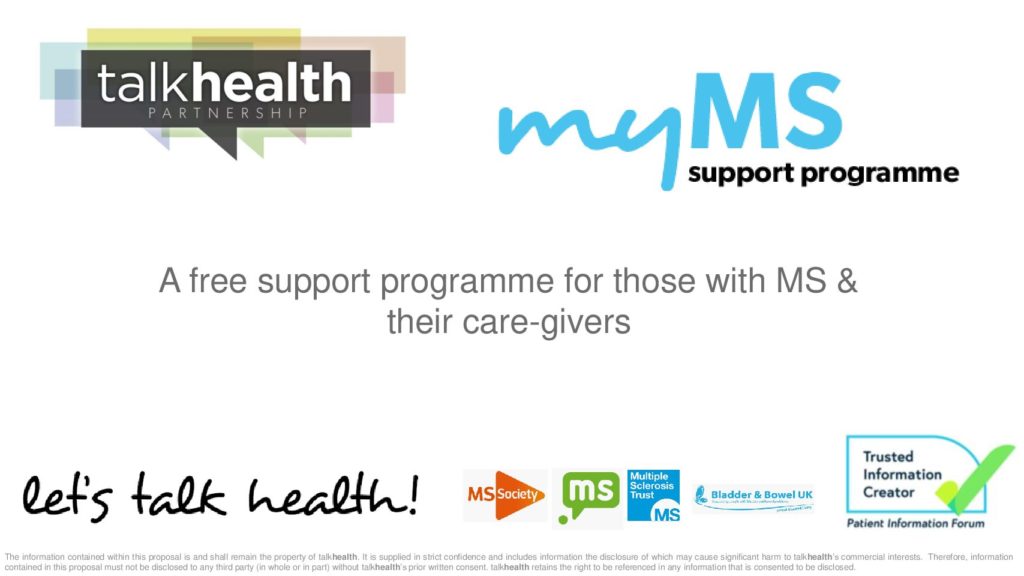| Reading University are doing a study on psychological intervention for people with MS. Please share this link with your members and encourage them to help inform the study and path of research in this area going forward. https://research.reading.ac.uk/neurodegenerative-diseases/multiple-sclerosis/ |
Helping to directly support your MS patients & caregivers – myMS

Self-care management and support education for chronic illnesses has never been more important than now for your patients and caregivers due to the current health and economic climate.
talkhealth is very proud to announce the launch of our latest support programme myMS, our twelfth support programme in our collection of programmes available FREE of charge to primary, secondary care and specialist clinics in the UK. The programme is focused purely on self-care management of the condition and has been jointly developed by MS experts, charities and talkhealth under the new PIF – Trusted Information Creator scheme (formerly NHS England’s Information Standard).

Do you shop online at AMAZON?

You can raise funds for MS if you order via our website. Just click on the Amazon Logo on www.omstc.org.uk and then shop as usual. It’s that easy!
Roughly 5% of the money spent will come to the centre. Right now we make roughly £30 a month from this source but it could so easily be alot more. Share with your family and friends…….
Raise donations for Multiple Sclerosis Therapy Centre Oxfordshire whenever you shop online
You can help Multiple Sclerosis Therapy Centre Oxfordshire earn bonus £5 donations*!
For every new supporter you refer who goes on to raise their first £5, we will then match this donation. Make sure you sign up and share with family and friends.
https://www.easyfundraising.org.uk/causes/omstc/?invite=22UNQQ&referral-campaign=c2s
To keep informed about news from the centre
To keep informed about news from the centre, including details on Covid19 closure/reopening of the centre, please sign up to the newsletter via the website main page www.omstc.org.uk.
Reopening of the Centre
The Committee has been discussing when and how the Centre might reopen, and is closely monitoring what other MS Therapy Centres are doing. There is no target reopening date yet, but it will be several weeks away at least. Whenever it is, we know it will have to have a very different look and feel about it. Perhaps the biggest question is the ability and willingness of staff, therapists, volunteers and members to adapt to the Centre’s “new normal”. Watch this space.
May 100 club winners
John Morris, 1st prize
Joel Baldwin, 2nd prize
Babs Copley, 3rd prize
Well done
Home Exercise film 6 now ready
 |
| Play now Dear Readers, Our 6th Home Exercise film is now available: Strength & Balance with Lucie Bowley. This session was recorded at home after lockdown and edited by us, which is why it looks a little different to the previous films. In this easy to follow class you will warm up your whole body, do an endurance section to work your heart and then finish with some stretches to cool down. You won’t need any equipment apart from a sturdy chair and some water to drink! The orange button will take you directly to the video. We always enjoy hearing from people how they are getting on with the films, or if you would like to take a short film of yourself doing the exercises we would love to see that too! Our colleagues at Age UK national (London) have asked if we have anything we could send them to use nationally to show what people are doing around the country to stay active whilst at home. This can help us to make the case for receiving additional funding. If you would like to send any feedback or a film clip, please send it to gg@ageukoxfordshire.org.uk Please do feel free to share these emails and films with anyone you think would enjoy them! With very best wishes, Generation Games |
| Play now |
Home Exercise film 5 now ready
 |
| Dear Readers, Our 5th Home Exercise film is now available: Tai Chi with Carol Doherty. This week we have a 14 minute Tai Chi session for you that can be done seated or standing. You will be mobilising the whole body using a combination of simple repeated movements that the teacher explains in a practical and easy to understand way. Tai Chi can help to improve balance and coordination as well as being excellent for mental health and calming the mind. The below orange button will take you directly to the video. Please do feel free to share these emails and films with anyone you think would enjoy them! With very best wishes, Generation GamesPlay now |
Home Exercise film 4 now ready
 |
| Dear Readers, Our Home Exercise film 4 is now published: Strength & Balance with Carol Doherty. This week’s session focuses on exercises to strengthen arms, legs and core as well as exercises to help maintain and improve balance. The below orange button will take you directly to the video (27 mins). Please do feel free to share these emails and films with anyone you think would enjoy them! With very best wishes, Generation GamesPlay now |




